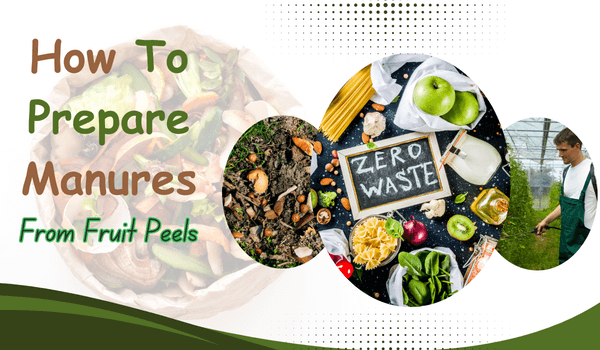We often discard the peels of fruits after consumption, unaware of the valuable nutrients they contain that can be highly beneficial for plants. These peels are rich in essential nutrients that can be utilized to create nutrient-rich compost for plants. By composting fruit peels, we can produce various types of manures from fruit peels, that not only nourish the plants but also promote healthy growth and abundant flowering or fruiting.
Making Manures From Fruit Peels
This homemade manure can be easily prepared at home, providing a sustainable and cost-effective way to enhance the health and productivity of our garden plants. Through mindful recycling of fruit peels, we can harness their nutritional benefits to cultivate thriving and vibrant green spaces while also reducing waste.
Manure From Banana Peels:
Banana peels are rich in potassium, magnesium, and calcium. These nutrients are abundant in quantity and are beneficial for enhancing the production of flowers and fruits by increasing the level of essential micronutrients in the soil. Incorporating banana peel compost into the soil helps in enriching it with these micronutrients, thereby promoting healthy growth and development of plants. By utilizing banana peels as a natural manure, gardeners can effectively nourish their plants and encourage a bountiful harvest while also adopting sustainable gardening practices.
How To Make and Use It
To create a potent manure, soak two banana peels in one liter of water for four days. Afterward, remove the peels and utilize the remaining liquid as a nutrient-rich manure. Applying this manure near the roots and on the leaves of plants accelerates their growth rate significantly. Moreover, it leads to a higher yield of flowers and fruits. By adopting this simple yet effective method, gardeners can harness the natural benefits of banana peels to promote the health and productivity of their plants, while also minimizing waste through eco-friendly gardening practices.
Manure From Mango Peels
Mango peels are rich in vitamins A, B, copper, and fiber. Utilizing mango peels can significantly accelerate the growth of plants due to the abundance of these essential nutrients. This natural source of vitamins and minerals aids in promoting robust growth, strong root systems, and lush foliage.
How To Make and Use It
Manure From mangoes can be prepared by finely chopping 2 – 3 mango peels and soaking them in one liter of water for two days. Afterward, strain the mixture and dilute it with two liters of clean water. By applying this solution to plants once every four to six weeks, gardeners can prevent premature shedding of flowers and fruits. This natural manure derived from mango peels not only nourishes the plants but also helps in maintaining their health and promoting a bountiful harvest.
Manure From Lemon peels
Lemon peels enrich the soil with essential nutrients, contributing to the nourishment of plants. They can be utilized in powdered form by incorporating them into the soil. Utilizing lemon peel powder as a natural fertilizer enhances soil fertility and promotes healthy plant growth. The nutrients present in lemon peels, such as potassium, calcium, and vitamins, aid in bolstering plant health and vitality.
How To Make and Use It
Prepare finely powdered lemon peels by grinding them thoroughly. Applying a handful of this powder per plant every five to seven weeks enhances leaf vibrancy and accelerates plant growth. Furthermore, this practice helps in preventing pest infestations and diseases, contributing to the overall health and vigor of the plants.
Manure From Orange Peels
Orange peels are incredibly beneficial for plants as they contain potassium, iron, zinc, and citric acid. These peels enrich the soil with essential nutrients, fostering the growth and development of plants. Additionally, they serve as a natural insecticide, helping to ward off pests and protect plants from infestations. By utilizing orange peels, gardeners can enhance soil fertility and promote healthy plant growth while minimizing the need for chemical pesticides.
How To Make and Use It
Soak two to three orange peels in a liter of water for three days. Then strain the mixture and dilute it with three liters of clean water before spraying it around the leaves and roots of the plants. This process promotes rapid flowering and fruiting in plants while also reducing the incidence of pests and diseases.
Manure From Apple Peels
Apple peels are rich in potassium, iron, vitamin C, and calcium, making them essential for the growth of plants. These nutrients play crucial roles in various physiological processes within plants, contributing to their overall health and vigor. Incorporating apple peel extracts into gardening practices can help promote stronger root development, enhance nutrient uptake, and improve resistance to diseases and pests.
How To Make and Use It
To prepare an effective organic fertilizer, crush two to three apple peels and mix them with half a liter of water. Let the mixture soak for a while before straining it. Dilute the strained liquid with another liter of water, creating a nutrient-rich solution. Applying this solution to plants once every six to eight weeks can significantly boost leaf growth, promoting lush foliage and encouraging the development of flowers and fruits. The potassium, iron, vitamin C, and calcium present in apple peels contribute to the overall health and vigor of plants, enhancing their resilience against environmental stressors and pest attacks.
Conclusion
Using organic manure in plants is a very efficient way of gardening and farming as it is a “best out of waste” activity. It reduces organic waste and provides plants with nutrients that are beneficial for them at the time of their growth. Preparing manures from fruit peels and using them also generates interest in gardening among kids.
In this blog, you will learn about
- How To Make and Use Manure From Fruit Peels
- What nutrients do they provide to plants?
This is how organic fruit waste is used for the benefit of the plants. Hope you have learned something useful after reading the blog and keep the nature around us clean.
